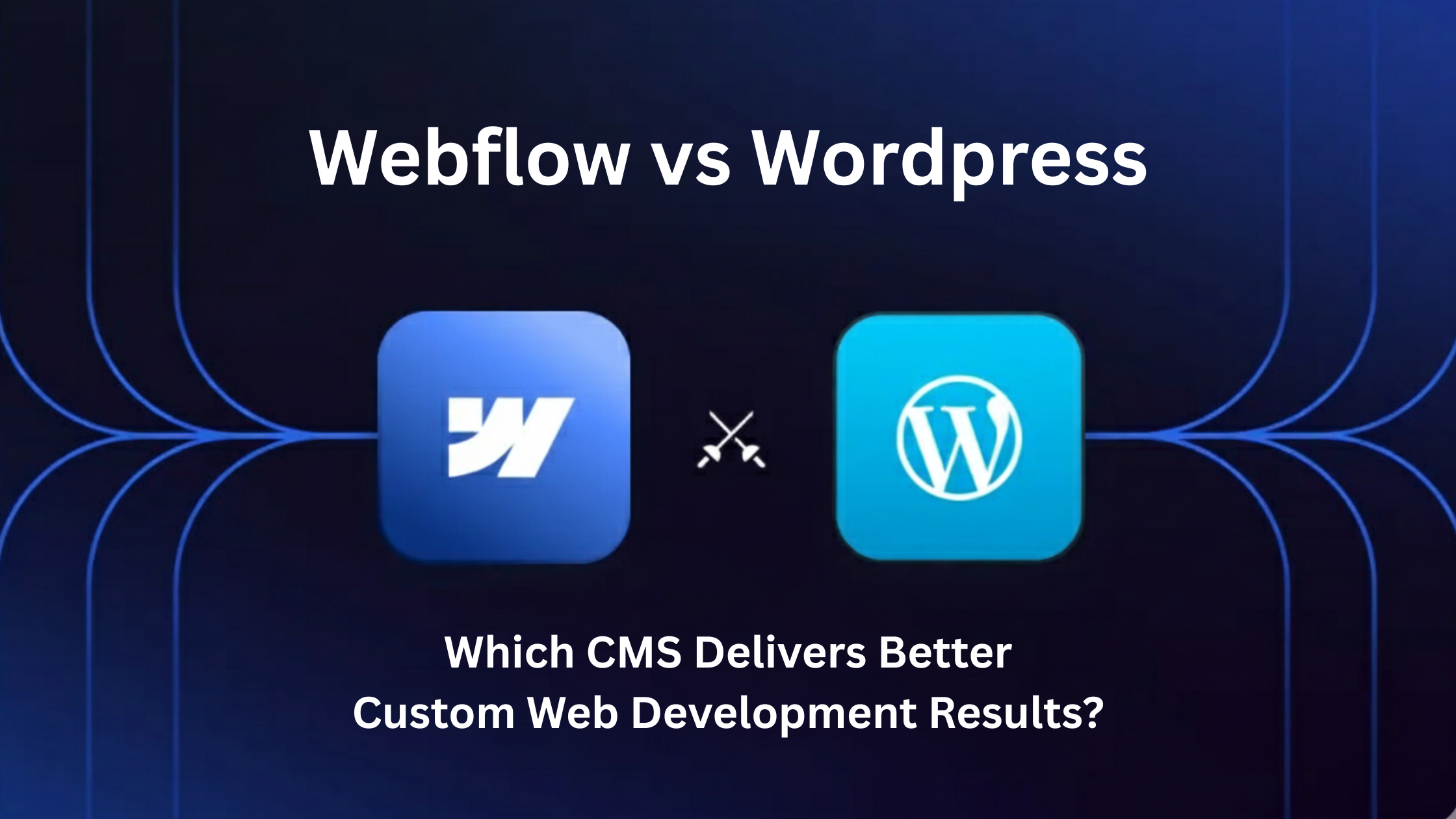Summary
Choosing the right CMS is key. WordPress vs Webflow boils down to flexibility versus speed. Webflow suits designers and small businesses for fast, visually stunning sites, while WordPress excels in custom web development, scalability, and advanced control, making it ideal for long-term growth.
Choosing the right CMS for your website can feel overwhelming. Two names dominate discussions in 2025: WordPress and Webflow. Both promise speed, design flexibility, and scalability but they approach web development very differently.
If you’re planning your next custom web development project, understanding the strengths and limitations of each platform is key. This guide will help you decide which CMS best fits your business goals, whether you’re a startup, a creative agency, or an enterprise-level company.
Why CMS Choice Matters
A Content Management System (CMS) isn’t just a tool to publish content. It’s the backbone of your website, affecting everything from performance and SEO to user experience and scalability.
WordPress is an open-source CMS known for its flexibility and scalability. It’s perfect for businesses looking to build complex, high-performing websites. Webflow, by contrast, is a cloud-based visual CMS that allows designers to create sites quickly without writing code. Both have their merits but they serve different purposes depending on your web development needs.
Design Flexibility: WordPress vs Webflow
When it comes to design, Webflow really shines. Its drag-and-drop interface feels intuitive for designers, offering pixel-perfect control over layouts, interactions, and animations. You can bring creative visions to life without touching a single line of code.
WordPress is slightly more complex but equally powerful. With page builders like Elementor, Divi, or Gutenberg, you can achieve highly custom designs. The difference is that WordPress often requires some coding knowledge for fully unique features, while Webflow handles most of it visually.
Key takeaway: Webflow is faster for design-heavy projects, but WordPress offers long-term flexibility, especially when paired with professional custom web development services.
Custom Web Development Capabilities
If your project involves advanced features, integrations, or enterprise-grade functionality, WordPress takes the lead. With WordPress, developers can:
- Build custom themes and plugins tailored to your business
- Integrate APIs and third-party software
- Develop complex dashboards or membership systems
- Scale your website as your business grows
Webflow is limited in backend customization. While it allows dynamic CMS content and visually-rich sites, it doesn’t support complex backend logic. This makes WordPress the preferred choice for businesses that need custom web development and full control over their digital platforms.
Performance and Hosting
Website speed is critical for user experience and SEO. Webflow offers managed hosting on global CDNs, ensuring fast loading times and minimal downtime. WordPress, however, gives you the freedom to choose your hosting provider, use caching solutions, and optimize server performance.
With the right developer, WordPress sites can outperform Webflow, especially for large-scale, traffic heavy websites.
SEO Capabilities
SEO is another area where WordPress shines. Plugins like Rank Math and Yoast SEO give complete control over metadata, schema, sitemaps, and redirects. Webflow also has solid SEO tools, but its flexibility is limited compared to WordPress.
If your website relies on SEO-driven traffic, WordPress gives more options to fine-tune your content and technical SEO.
eCommerce and Integrations
For eCommerce businesses, WordPress combined with WooCommerce is unmatched. You can create advanced store functionalities, multi-currency support, and integrate seamlessly with CRMs and marketing platforms.
Webflow eCommerce is visually appealing and user-friendly, but it has limitations in handling complex store operations. For businesses aiming for scalability and custom features, WordPress is the better investment.
Scalability and Maintenance
WordPress is ideal for scaling. Many global brands rely on it for large, complex websites. With WordPress, your site can grow as your business grows integrating new features, APIs, and performance optimizations without major limitations.
Webflow is best suited for smaller sites or portfolios. While maintenance is easier since hosting is managed, you may face limitations as your business grows.
Cost Comparison
The cost of building a website varies depending on the platform. WordPress itself is free, though hosting, premium themes, and plugins come with a cost. Hiring developers for custom web development is where investment increases but the ROI is worth it for scalable, feature-rich websites.
Webflow works on a subscription model. Hosting, CMS, and design tools are included in the monthly fee. While it may seem cost-effective initially, larger projects can become expensive, especially with eCommerce or multi-site needs.
Webflow is good for small projects or portfolios, but WordPress offers better long-term value for businesses that require custom web development and scalability.
Security and Control

Security is vital. WordPress gives you full control; you can set up firewalls, backups, and manage vulnerabilities with tools like Wordfence and Sucuri. Webflow provides managed security and SSL automatically but limits control.
For businesses handling sensitive data or enterprise-level functionality, WordPress provides greater control and peace of mind.
Future-Proofing Your Website
WordPress is highly adaptable. You can integrate AI tools, create custom web apps, or build multi-site networks. Its open-source nature ensures that your website won’t be tied to one provider’s ecosystem.
Webflow, while visually powerful, is not open-source. Migrating away or scaling beyond its ecosystem can be challenging. For businesses planning long-term growth, WordPress paired with expert custom web development is the safer, more flexible choice.
WordPress vs Webflow
So, which CMS should you pick?
- Webflow is perfect for designers or entrepreneurs who need fast deployment, visual control, and minimal coding. It’s ideal for small businesses, portfolios, and creative agencies.
- WordPress is the go-to for businesses that need custom web development, advanced functionality, and scalable, high-performing websites. Its flexibility, robust ecosystem, and SEO capabilities make it the preferred choice for growing companies, startups, and enterprises.
WordPress vs Webflow boils down to flexibility versus speed. Webflow suits designers and small businesses for fast, visually stunning sites, while WordPress excels in custom web development, scalability, and advanced control making it ideal for long-term growth.
Ready to build a website that truly scales? Contact our team today and let’s choose the perfect CMS for your business.







